Picture this: your own digital space, where you’re inspiring others with words drawn from your faith and experiences. You’re helping others find their spiritual path while enriching your own journey.
Sounds exciting, right?
Well, it can certainly be a reality. If you’re wondering how to start a Christian blog, then stick with me as I guide you through the process.
Editors Note
This guide is extremely DETAILED and explains everything you need to start a Christian blog. I’ve been at this blogging stuff for over 8 years and have built a business making $20,000 per month, so I have a lot of helpful advice for you newbies out there.
If you get stuck or need advice, I HIGHLY recommend that you get my 100% FREE blogging course by clicking here. If that doesn’t help please contact me directly and I’ll help you out for free.
How to Start a Christian Blog in 10 Steps:
If you just need someone to walk you through the process of how to start a blog quickly and easily, check out step 5.
According to Internet World Stats, 67.9% of the global population is on the internet in 2021. This means a single blog post can reach millions, even billions, of people on every continent.
So if you’re wondering how to become a Christian blogger, don’t worry; Evangelism has never been simpler!
Where missionary work once required going out into the world and spreading the gospel, now you can reach a much larger population without ever leaving home with the help of Christian blogging.
There are many reasons why you should learn how to start a Christian blog.
Do you have a story that must be told?
Has God given you a message that can potentially transform hearts?
Are you looking for a way to add value to the world while generating passive income?
If you answered yes to any of the questions above, then this is the platform for you. Creating a Christian blog can help you do all of those things and more.
Here are some additional reasons why it’s a good idea to start a Christian blog:
Share Your faith as a Christian
You might be hesitating because you think that your story does not matter, or that someone has already told your story. Maybe you believe that you are not experienced enough to teach others.
However, I’m here to tell you that none of the other Christian bloggers out there have your voice or your unique experiences.
They are not reaching the people you could be reaching, and none of them will be able to do the work God has placed before YOU!
Make an Income for Your Family
While making money should not be your primary concern when starting a Christian blog, blogging can be hard work. You will spend a lot of time on blog upkeep, content creation, social media promotion, and so on.
While spreading the word of Christ, we must also provide for our families. There are many Bible verses that tell us that we deserve the wages we receive for serving the Lord. For example:
“The laborer is worthy of his wages.” (1 Timothy 5:18)
So, if you’re someone who has any conflict about making money by sharing the gospel, you can rest easy. Just remember to keep God at the center of your heart and follow His direction. As long as you are serving Him, He will provide for you.
Connect with Other Christian Bloggers Around the World
Your blogging journey will enable you to connect with many of the most wonderful Christian bloggers from all around the world.
These men and women share amazing testimonies of their own about how God impacted their lives – and blogging gave them the ability to share their stories with countless people beyond their own families, neighbors, communities, and churches.
As you can see, there are many reasons for you to start a Christian blog right now!
Unfortunately, I see a lot of people who get stuck in the initial process of starting a blog. They never get to achieve their dreams simply because they don’t know where to start or because they believe the process of creating a blog is too complicated.
This post will dispel any fears you have in that regard. I’ve outlined the process of starting a Christian blog in a simple, step-by-step process that is easy to follow.
1. Decide the Focus of Your Christian Blog
The first step in starting a Christian blog is (obviously) to ask God for guidance. As the Bible says:
“Live your life for God, and in everything you do, put God first. He will direct you and crown your efforts with success” (Proverbs 3:6)
I’m assuming you’ve already asked God to guide your efforts, and that you already have confirmation that He is leading you in this direction, and so that’s why I moved our second step up to #1 🙂
What you have to do now is to find the focus of your Christian blog by narrowing it down to one specific message that God has planned for you.
Who do you want to help?
Who is it that you will be writing for on your blog?
The nature of blogging is such that if you try to write for everyone, you will reach no one. But, if you focus on one segment of the population, you’re likely to reach many. Although that sounds a little counterintuitive, it’s true. Writing a Christian lifestyle blog will be a different experience altogether than writing a generalized Christianity blog.
So which specific audience are you going to be targeting? By having a narrow focus, you will make it more likely that your new Christian blog will gain traction quickly.
To help you come up with a focus or direction for your blog, think about which groups of people you would like to help. For instance:
- Moms
- Entrepreneurs
- College students
- Homeschoolers
- Women in ministry
- …and so on.
There’s no need to go too narrow at this stage. Simply brainstorm ideas to find what’s most appealing to you.
You could create:
- A Christian parenting blog
- A blog for helping Christians in business
- A blog for bible studies
- A blog that provides resources for Christian women
- A blog that offers advice/counseling for those dealing with chronic health issues
- A blog that’s focused on scripture
- A Christian lifestyle blog
- …the options are endless!
Many people find themselves in quite a dilemma at this stage. They have many different audiences that they could write for and find it hard to choose just one.
If you find yourself in such a situation, my suggestion is to do your best to narrow it down by finding common threads between the different topics. Finding the middle ground gives you a unique focus for your Christian blog.
If you’re still having trouble, pray on it – and then go in the direction you feel more strongly drawn to.
2. Choose Your Christian Blog Niche
Your blog should have a clear purpose. This will make it easier for your readers to find you and for them to identify with your teachings.
A niche basically refers to the overall ‘theme’ of your blog. It’s the specific topic you plan to write about. Although faith and Christianity are considered niches, they are quite general in nature. So, simply starting a ‘Christian’ blog to spread the word of God with the world is just too general. You need to niche down a little more.
One of the best ways to narrow down your niche is to think about what you’re passionate about. While Christian writers are certainly passionate about Christ, they also have particular passions.
For instance, you could start a Christian marriage blog if you’re passionate about marriage. Your topics would relate to things like faith and relationships, marriage, raising a family, and so on. But even that ‘Christian marriage’ category can be further broken down into different subcategories, such as:
- Blended families
- Divorce
- Second marriage
- Parenting teens
- Teaching small children about Christ
- Marriage counseling
- Marriage retreats
- Christian non-profit organizations
- …and many more.
The people in each of these different situations would obviously need different types of advice as well as biblical inspiration. So a general ‘Christian’ blog wouldn’t be able to satisfy all their specific needs.
Here are some of the most popular Christian blog topics for you to choose from:
- Devotions
- Christian marriage
- Faith in business
- Christian musicians
- Christian motherhood
- Christian budgeting
- Christian lifestyle blog
- Athletes looking to grow in their faith
- Christian dating
- Second marriages seeking Christ
- Christian bloggers
- Addiction recovery for Christians
- Christian social media consulting
- Counseling for parents of special needs children
There are a lot more directions that you could go with your Christian blog. Of course, if you really wanted to, you could have a more general blog, but remember it’s important to niche down if you want people to find you easily online.
Also, you’ll want to break down the topic you choose into 3-6 subtopics or categories of content. Keep in mind that your focus should only be on a few categories at the beginning. Writing about a whole lot of different things will simply confuse your readers.
You want someone to feel that they’ve found their tribe when they get to your website because you have exactly what they’re looking for, as opposed to them having to sift through tons of content just to find the topics they want.
By keeping the number of topics on your blog to just a few general categories, you will be able to create relevant content and quickly draw in a large following.
Once you have chosen a niche for your Christian blog, it’s time to move on to the next step.
3. Choose Your Blogging Platform
Your next step is to choose a blogging platform.
Now if you’ve never blogged before, you may be asking yourself: “So, what is a blogging platform?”
Simply put, a blogging platform is the This is simply software that enables you to publish content on the Internet. In other words, it’s a content management system that lets you post your blog posts for everyone to see.
Now here’s the thing, you have plenty of blogging software options available to you when starting a blog. Some of them are paid, and some are free. Free options include Blogger, Wix, Squarespace, and Tumbler. Although being able to start a blog for free may sound great at first, these platforms come with a lot of constraints.
Here are some of the disadvantages that come with building your blog on free blogging platforms:
You can’t have your own domain name. Instead of a URL that looks like ‘yourblog.com’, yours will look like ‘yourblog.squarespace.com’. This looks ugly and unprofessional.
You can’t monetize your Christian blog. Ads on your blog will be run by the blogging platform and not by you. This means that you are not in control of the products being promoted and you can’t decide where the ads are placed. Also, you can’t use AdThrive, Mediavine, or any other third-party ad networks.
You don’t actually own your blog. This is undoubtedly the worst thing about using a free blogging platform to start a Christian blog. It’s similar to your Facebook profile in the sense that you have login and password details, but the provider can decide to remove your website from the Internet for any number of reasons.
It’s easy to see why it’s not a good idea to use any of the free options listed above.
So what should you use?
I always recommend WordPress when starting a new blog, and it’s also the platform that I use. Keep in mind that WordPress.org is different from WordPress.com (the free blogging site).
WordPress.org is a self-hosted platform that powers over a third of the websites on the Internet.
It gives you full ownership and control of your blog. You can design and brand it however you like, and there are plugins and other tools that will help you expand the functionality of your site. And, when it comes to monetization, your options are limitless.
Listed below are the advantages of choosing self-hosted WordPress over free blogging platforms:
- WordPress is a 100% open-source software that is free for anyone to use
- You have total control over your site and can customize it however you like
- You own everything on your site, including all the data
- There are countless WordPress plugins that you can install on your site
- You can sell ad space on your blog to anyone and keep all your advertising revenue
- You can sell your own products on your blog
- WordPress even allows you to create your own courses and membership site
Whether a beginner or an experienced veteran in the blogosphere, my advice is to go with WordPress.org when building a Christian blog. You can then install that blogging platform on any web hosting server you choose (more and that in a little bit).
4. Decide Your Domain Name
Your next step is to decide what you’re going to call your new Christian faith blog and I’ve created this list of Christian blog name ideas to help. This part is important because your domain name is like your home address. This is what people are going to be typing into their browsers any time they want to visit your blog so you want it to be something that is memorable and easy to type.
For most people, this is the hardest step and their Christian blogs usually take too long to get up and running, negatively impacting potential traffic. Don’t let that happen to you. Read below to discover the ten steps to finding a great name for your Christian blog.
1. By a .com Domain Name: These days, there are many domain extensions to choose from, including .church, .faith, and many more. But, I always feel that it’s best to go with .com as it just makes it easier to remember.
2. Don’t Go Too Narrow With Your Name: If you choose a URL that is too specific, it’ll make it very difficult for you to expand your blog in the future. For instance, if you choose a name like ‘ProverbsTeachings.com’, you’ll be stuck within that one very small topic as opposed to a name like ‘BibleTeachings.com’ which will allow you to write about a wider variety of topics.
3. Keep It Short: Shorter domain names are easier for your audience to remember. Try to keep your name under four words. Ideally, it should be 2 to 3 words. For instance, instead of a domain name like ‘SpreadTheWordOfChrist.com’, you might choose ‘SpreadGodsWord.com’’ instead.
4. Use Alliteration: Alliteration is where two or more words begin with the same sound or letter. Using alliteration in your domain names will make them more memorable. For instance, ‘ChristianCentury.com’, or ‘ColdCaseChristianity.com’.
5. Get Creative: If the name that you want for your Christian blog is already taken, don’t give up. Find other words with similar meanings and use these synonyms instead. For instance, if you wanted your blog to be called ‘Christian Conquerors’, you might choose ‘Christian Victors’, instead.
6. If Nothing Else Works, Add Extra Words: You can add words like ‘the’, ‘home’, ‘bible’, ‘faith’, ‘ministries’, ‘scriptures’, and so on in order to get the name you want. For example, if you wanted the name ‘Christian Today’, instead you might get ‘Christian Faith Today’, or something similar.
7. Think of a Concept around Your Domain Name: When choosing a name for your Christian blog, think about how you could be branded and how your blog could expand in the future. This will help you brainstorm great names for your new blog.
For instance, the blogger who came up with ColdCaseChristianity.com is a homicide detective who uses the ten principles taught in cold case investigations in a religious context. This concept helped him decide on the name for his blog.
8. Use Name Generation Tools: If you’re still stuck, there are plenty of tools online that you can use to help you come up with amazing names for your new Christian blog. Examples include Lean Domain Search and Instant Domain Search.
9. Don’t Purchase a Domain Name: The name you want may already be taken and you might find it being offered for sale for hundreds or even thousands of dollars. Don’t be tempted to buy it. It’s not worth it at this stage.
Instead, focus on creating content for your website, and one day, when your Christian blog is profitable, then you can choose to purchase any domain name you want.
10. Do Not Get Stuck Here: A lot of people spend so much time here that they never get to move forward. Yes, a domain name is important, but you don’t need to spend more than a couple of hours on this step.
Find a name that you’re happy with and move on to the next step. Taking action on your business idea is way more important than the domain name.
5. Buy Your Domain Name and Hosting
The next step in the process of creating your Christian blog is to actually purchase your domain name and hosting.
To help you understand how everything works, think of it this way:
- Your domain name is like your home address
- Your hosting is the real estate that your Christian blog sits on
- WordPress is the actual house on the Internet, with flooring, sheetrock, and various permanent fixtures.
So, when someone types in your website URL, then Bluehost will show your blog to the individual who searched for it.
I’ve created a step-by-step tutorial to walk you through the entire process of buying your domain name and hosting. The first thing you need to do is click on this link to visit Bluehost and follow along with the tutorials below.
Below is a YouTube video and screenshots showing you the exact step-by-step process, choose whatever tutorial works best for you.
Step 1: If you haven’t yet, click on this link and you’ll be brought to the WordPress Hosting page that you see below.

Step 2: Next, you’ll be brought to the hosting plan page. You could choose to get a “Plus” or “Choice Plus” plan, but honestly, that’s not a requirement.
The Startup plan is the cheapest at $2.95/month through my link vs. the normal $8.99/month.
This plan has everything you need including 50GB of web space (plenty of room for your files), a free domain for a year, plus other standard features like a free SSL and a secure WordPress install. Feel free to browse a bit to decide the right plan for you, but rest assured that Basic will work just fine if you want to minimize your investment.
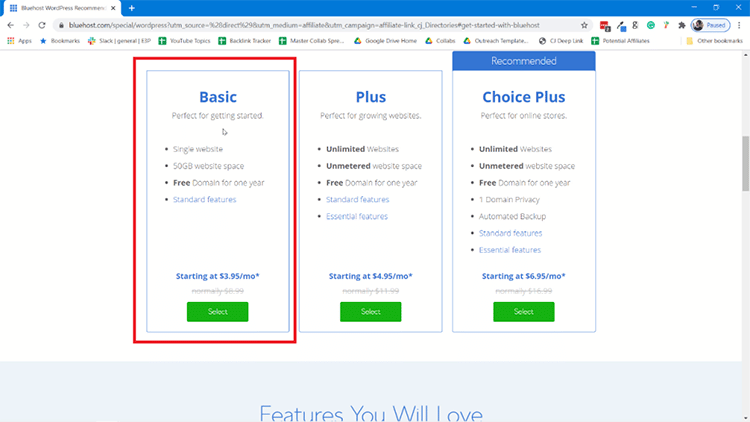
Step 3: After clicking into the plan, you’ll be brought to the next page where you will type in your new domain, or you can just choose “I’ll create my domain later” if you haven’t decided on one yet. The domain is the URL people will type into a browser to view your website in the future.
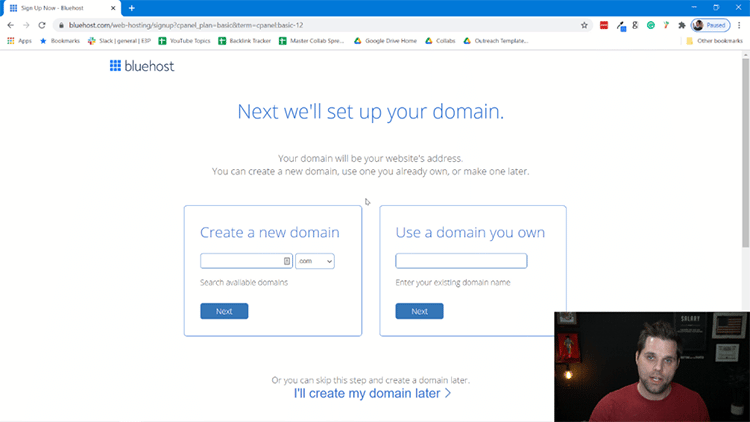
Step 4: Once you submit, the next page will ask for all of your information. That will start with your account information, which is self-explanatory.
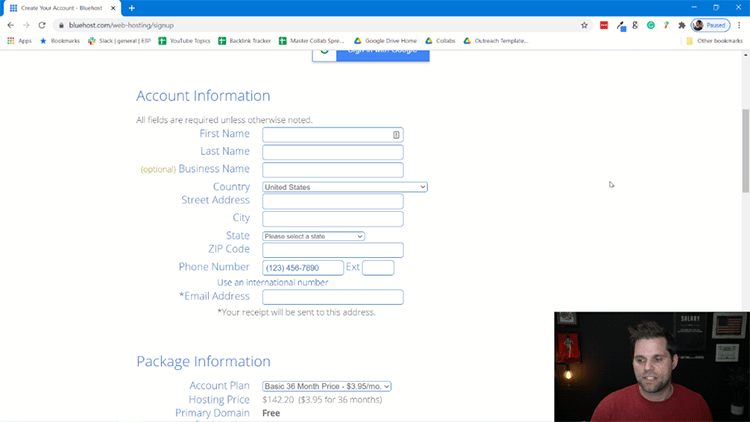
Step 5: Next, you’ll have to input your Package Information. This is to choose how long you want the plan to go for. My advice is that you choose 24 months to get the discount and save some money, but you can go as low as 12 months if you want.
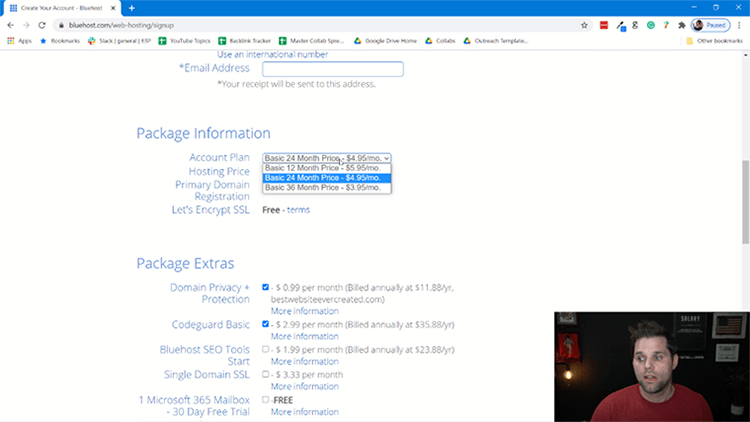
Step 6: Next you’ll have to choose what “Package Extras” you want. You can scroll over “More Information” to understand what each of these items is, but here is my own advice.
I would get the “Domain Privacy + Protection”, this makes it so that no one can tie your name to the domain name you create. To me, the only other one worth considering is “Codeguard Basic”. The other two I wouldn’t personally get. But choose what is best for you.
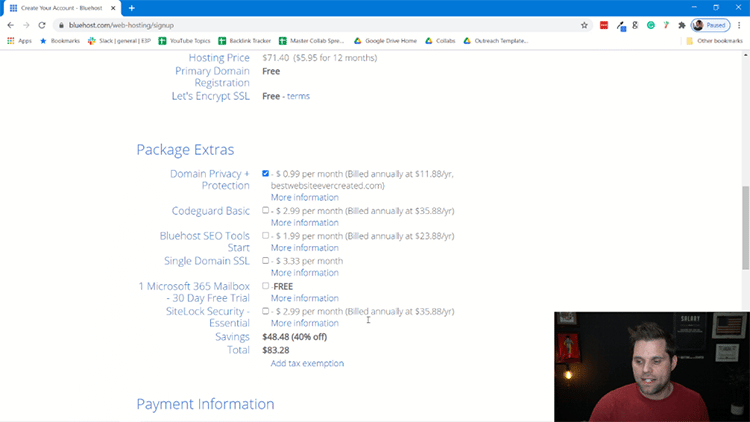
Step 7: The next step is Payment Information, which is self-explanatory.
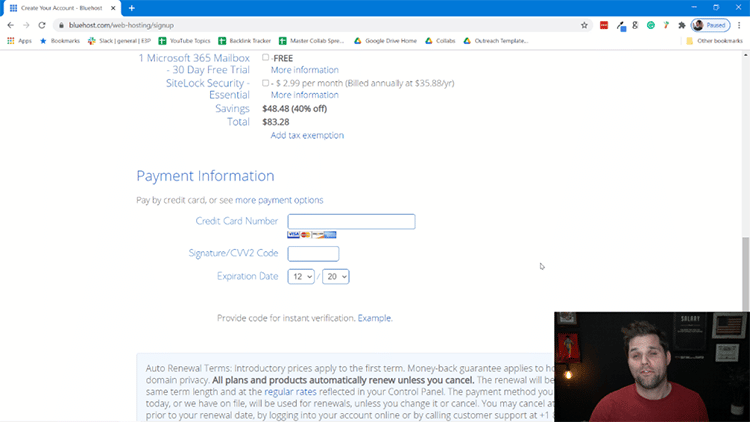
Step 8: And the last step of signup is to confirm that you read and understand the Bluehost Terms of Service, Cancellation Policy, and Privacy Notice. Click the check button and then click “Submit”.
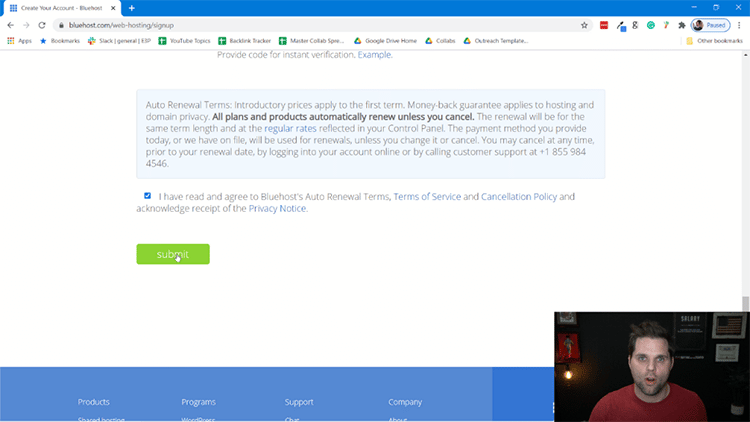
Step 9: Next you’ll be prompted to create an account and password. This is the information that you’ll use to log in to the Bluehost platform to manage your site and account info.
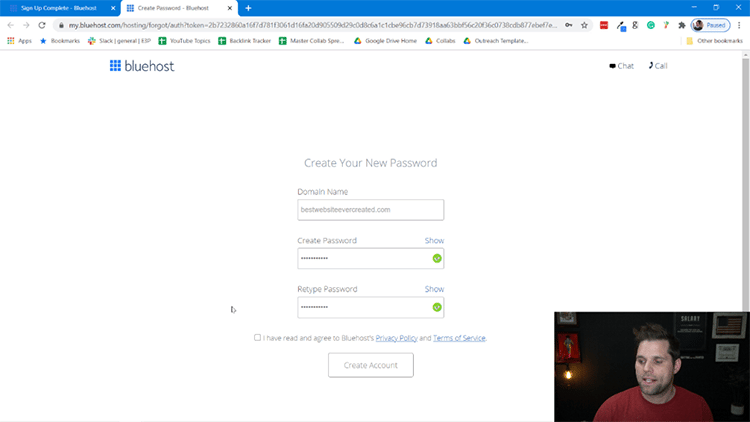
Step 10: At this point, Bluehost puts you through a short questionnaire to better understand your scenario. You can answer all of these questions, or click “Skip this Step” on the bottom. If you’re a newbie, I advise you to answer the questions as it’ll help your onboarding experience.
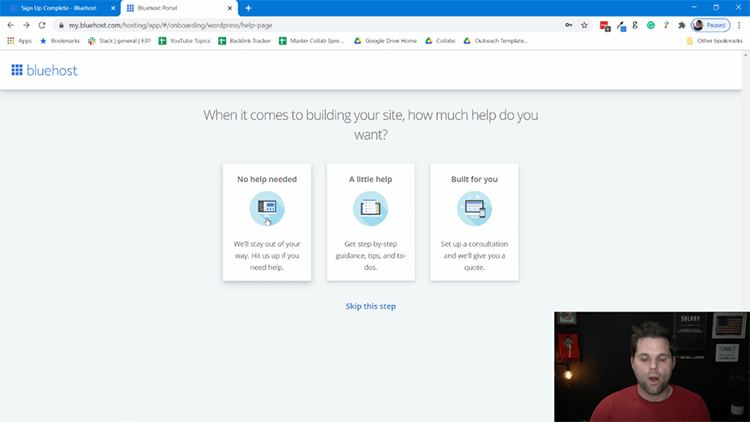
Step 11: After you’re done with that you’ll be advised to choose a theme. For now, you can just choose to use a free theme. You can always replace the theme later if you’d like.
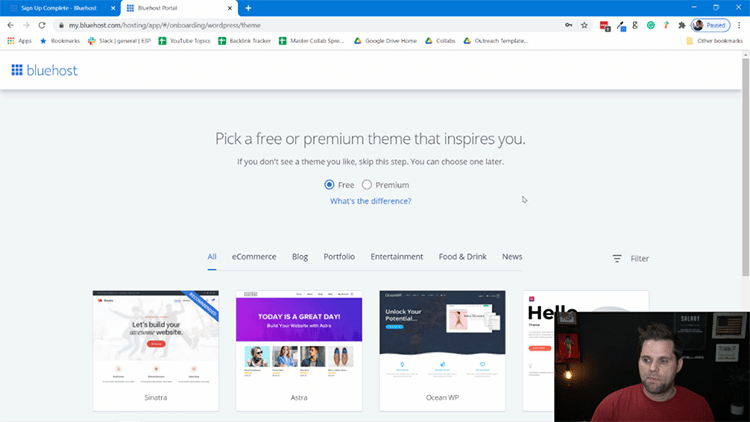
Step 12: From there, you’ll be brought into the backend of WordPress in the admin panel. This is where you’ll manage your site from. You can add posts/pages as you see fit, but when you’re ready click on the blue button that says “Launch Your Site”.
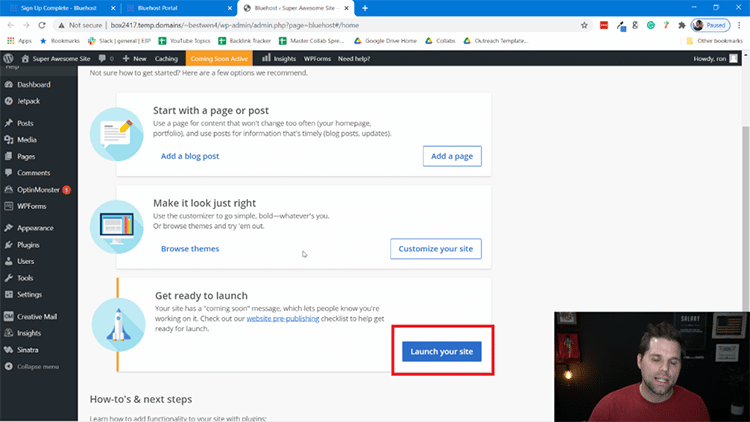
Step 13 (Final): Your blog is LIVE. Just go to a browser and type in your domain name. Once you do this, you’ll be able to access your website!
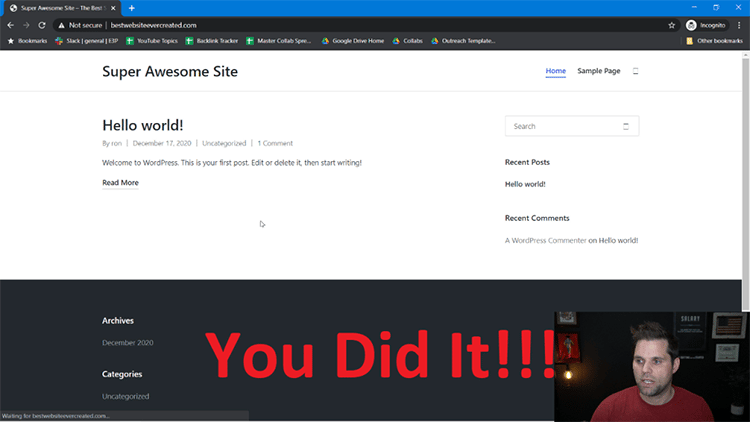
Congrats! You officially have a website.
If you’re wondering how to edit things on the website, all you have to do from here is go to your website URL with /wp-admin at the end in a browser and log in.
Example: http://mostawesomewebsiteever (dot) com/wp-admin
And don’t worry, we cover how to edit things more in the rest of this guide as well. So please continue reading.
6. Choose a Theme For Your Christian Blog
A theme is simply the front-end design of your website. It’s software that dictates the appearance and style of your blog. If your domain name is your web address, your hosting is the real estate, and WordPress is the actual house – then the theme is the furniture and interior decor.
Research from Sweor has shown that a visitor’s first impressions are 94% design-related. Make sure to present your website in an aesthetically-pleasing way and do your best to make it as functional as possible.
WordPress comes with a default theme that you can easily swap out for one of your own choosing.
There are many different themes for you to choose from, both free and paid. As with blogging platforms (and everything else on the Internet), free options come with certain limitations.
For instance, many free WordPress themes tend to come bundled with malicious malware that could potentially damage your website. Also, free themes don’t have great customization features, and they look very unprofessional. Listed below are some of the benefits of choosing a paid theme over a free alternative.
Benefits of Using a Premium WordPress Theme
- Premium themes are fast, and Google loves fast websites
- You can choose from a wide range of templates to suit your taste and preference
- They are easily customizable so you can have your blog look exactly how you want it
- You get full support in case you have problems or questions
- Premium WordPress themes are updated regularly
As a Christian blogger, the last thing you want is a boring, uninviting home on the Internet and that’s why it’s important to choose a good theme.
Luckily, WordPress has a wide variety of amazing Christian blog themes that are offered at an affordable price. Below, you will find some of the best themes for new bloggers with different layouts and varying abilities and functionalities.
Any of these themes will allow you to build an amazing Christian blog that resonates with your niche and your audience.
Themes That Are Great for a Christian Blog:
Here are some options to consider:
1. Divi: If you’re looking to design a stunning website with ease, Divi from Elegant Themes stands out as arguably the best WordPress builder available today. Its intuitive visual drag-and-drop interface empowers users to craft amazing sites quickly. What sets Divi apart is its vast array of customizable modules, real-time design feedback, and a responsive editing feature that ensures your website looks impeccable on any device.
2. Astra: While Divi is renowned for its versatile design capabilities, the Astra theme offers a distinct set of advantages for those prioritizing speed, performance, and seamless integration. Astra stands out for its feather-light weight, ensuring that websites load at lightning-fast speeds—a critical factor for SEO and user experience. Moreover, Astra’s deep compatibility with major page builders, including Elementor and Beaver Builder, means that users aren’t restricted to a single design environment. The theme is also built with a focus on customization as well. You can read my Astra Theme Review is you want to learn more.
3. Themeforest.net: Themeforest has a significant amount of themes far beyond other platforms out there. There are over 48,000 total themes available on this platform, so you can find whatever you need.
Here are some other theme options that are perfect for a Christian blog.
- Grace Church and Religion Theme
- Faith and Hope Christian Blog Theme
- Charity WordPress Theme
- Blessing Responsive Religion Theme
Each of these themes is perfect for a Christian blog. These themes are stable and built with superior coding. They are always updated and they have awesome support in case of issues with installation or if you have any questions.
What to Look for in a Great Theme:
- The theme should be fast
- It should be mobile responsive
- It must be easy to customize
- The theme should offer great support
- It should have good ratings online
- Finally, the theme should come from a reliable brand
7. Create Essential Pages & Logo
Now that your website is all setup, it’s time to create the essential pages. On your WordPress dashboard, simply navigate to ‘Pages’ and click ‘Create new page’.
You will need to create an About page, Contact page, and Privacy Policy page.
Of course, you may decide to add other pages depending on the type of Christian blog you are creating.
Here’s what to include in each of your blog’s essential pages:
About Page: On this page, add information about yourself and the reasons why you started your Christian blog. Make it clear to your readers what your purpose is and what you hope to achieve with your blog.
Don’t be afraid to show your personality. Your readers want to get to know you and this is the perfect place to let them know who you are. You may even include a picture of yourself on this page. Make sure to write in the same tone of voice that your readers can expect on your blog.
Contact Page: On your contact page, you need to have all the necessary information to make it easy for your readers and followers to get in touch with you.
For instance, you might have your phone number, email, Skype, social media handles, or any other contact methods that you choose to use. In addition to that, you also need a contact form on this page to make it easy for anyone to get in touch with you quickly.
Privacy Policy: A privacy policy page is essential for your Christian blog. It serves the purpose of protecting both you and your readers with regard to the information you collect on your blog.
Check out my list of the best privacy policy generators for free and paid options to help.
Create a Logo: It’s also a good time to focus on creating a logo for your Poetry blog. There are a LOT of different ways to do this, but I’m a big fan of using one of these logo makers.
Pro Tip: Take a look at other blogs in your specific niche. See how they structured their essential pages to get ideas for your own. What are the additional pages they have? What type of information do they provide? Use this information to inspire more ideas for the pages on your own blog.
8. Begin Blogging
Now comes the fun part of my how to start a Christian blog guide: the actual Christian blogging. If you’re a new blogger, you may find it a little difficult to come up with ideas and writing categories. In fact, even experienced bloggers sometimes get stuck on what to write for their Christian blog.
If that’s you, don’t worry, I’m going to give you a few ideas to help you get started creating high-quality, practical, and informative blog posts.
Just keep one thing in mind – you need to have at least 10 blog posts written and published before you start promoting your new blog. This is the only way Christian blogs can grow fast from the get-go.
How to Create Great Content for Your Blog
To create awesome content for your Christian blog, you need to present solutions to problems that your readers are having. The worst thing a blogger can do is to create a blog where they only talk about themselves and their experiences, without bothering to identify or solve anyone else’s problems.
So, break down your niche into about 3 to 6 categories or subtopics.
For instance, if your chosen niche is ‘Christian marriage’, here are a few blog ideas you might consider writing about:
- Marriage
- Parenthood
- Theology
- Christian Blogging for Moms
- Couple’s Counseling
- Marriage Retreats
You can always add a new category in the future but when you’re starting out try to focus on just a few subtopics.
Now, brainstorm different titles for each category. If you having trouble with this, you can use free online tools like SEOPressor.com to help you come up with titles for your blog posts.

Once you have a list of at least 10 posts, it’s time to start writing. As you’re writing your blog posts, keep these blogging tips in mind:
- Have a definite goal for each post that you write. What are you trying to communicate and what do you want your readers to take away from your blog post?
- Use emotion in your writing. People respond to emotions and posts that leverage emotions tend to get high engagement from readers.
- Ask questions. In order to encourage two-way communication with your readers, always ask questions in your blog posts.
- Tell stories to keep your audience engaged. Don’t be afraid to share your personal stories to inspire your audience and keep them engaged.
- Stay on topic. Each post you write should fall within one of your categories.
- Add keywords. You must use a variety of topic keywords within your blog post so readers can find it online.
- Learn from other Christian blogging platforms: If you ever hit a slump and can’t come up with new Christian blog topics, taking a look at what other blogs on Christianity are writing about can give you some fresh ideas. It’s a good idea to analyze successful Christian blogging platforms every month or so to keep your info (and blog) up to date.
Remember when you determined your ideal audience in the first step? Knowing who you’re writing for is important because the way you write (that is, your translation of Scripture) will be highly impacted by your target audience.
For instance, the way you would create content to help an audience of young, married millennials would be very different from writing to inspire a single mom looking for advice on Christian dating.
Your style of writing will also differ depending on whether you’re writing to older or younger people. Creating a Christian lifestyle blog can require even more specific writing characteristics, such as the use of visual media (images and videos), or specific terms to appeal to your target audience.
Other factors that affect your writing include gender, time of life, parenting status, marital status, etc. These are all things that can play a huge role in whether or not your Christian blog succeeds.
The more targeted your niche and audience from the beginning, the better your chances of making your blog a success. It’ll be simpler for you to come up with the right type of content, and you have an easier time building an audience of avid followers.
Ultimately, this will also make it easier for you to monetize your blog if you decide to do so.
Once you have at least 10 posts published, it’s time to move on to the next step which involves sharing your new Christian blog with the world!
9. Promoting Your Christian Blog
Christian blogging doesn’t just involve writing content and placing it on your blog. You still need visitors for your blog to achieve success and the best way to do that is by promoting it.
There are many different ways in which you can promote your new Christian blog. Listed below are some of the most effective ways of getting visitors to come and read your content.
Share Your New Blog with Family and Friends
The first thing you should do is tell your family and friends about your new Christian blog. Ask them to come and check it out and leave comments and feedback. Also, ask them to share it with their own network of friends in order to give your new blog even more exposure.
Promote Your Christian Blog on Social Media
It’s a good idea to set up social media accounts with the same name as your Christian blog. This is where you’ll start to promote every post that you write. However, if you’re just starting out, you can promote your blog on your current profiles. Pinterest, in particular, is very effective for promoting Christian blogs.
Also, you can join different forums and groups where your target readers are hanging out. Share a link to your blog on these forums and ask other members to visit your blog.
Leverage the Power of Email Marketing
One of the first things you should do when you begin blogging is to set up an email list. As your email list grows, you’ll be able to promote your blog posts to your email subscribers through email marketing.
However, in the beginning, you can simply send out a link to your new blog to all your email contacts. Ask them to visit your Christian blog, read your posts, leave comments, and share your blog with others.
Search Engine Optimization
According to a study by Backlinko, just 0.63% of all Google searchers click on results from the second page. This tells us that more than 98% of them never go past the first page of Google.
SEO is extremely important for giving your blog visibility on the Internet, but it’s constantly changing and you have to continue learning to keep yourself up-to-date with all the latest SEO best practices.
However, in the beginning, focus on including important keywords in all your posts so that Google can help your readers find your blog. This is the single most effective strategy for promoting your blog so make sure you get it right from the very start.
10. Start Making Money
At this point, you may be wondering how to make money as a Christian blogger since you’ve learned everything about how to start a Christian blog.
If you decide to monetize your Christian blog, there many different ways in which you can start to make money. Here are some of the most common methods that Christian bloggers use to monetize their blogs:
Join Ad Networks
All you have to do is join an ads network like Google AdSense and Media.net, or one of these Adsense alternatives, and they will show their adverts to visitors on your blog. You get paid a small fee every time one of your readers clicks on an ad.
Sell Ads Directly to Advertisers
Another option is to sell ad space on your blog directly to advertisers. This allows you to choose which advertisers you want to accept or decline. However, it also means you have to find advertisers yourself, process the payment, and also provide them with reporting and analytics.
Monetize with Affiliate Marketing
Affiliate marketing is where you join an affiliate network like Amazon’s affiliate program or ClickBank and get paid for referring customers to specific products, such as books, courses, clothing, etc.
As a Christian blogger, you will be promoting third-party products and services on your blog, and each time one of your readers makes a purchase, you get paid a commission.
Some website builders for affiliate marketing are better than others so make sure to compare and analyze them to determine which one is best for your needs.
Sell Your Own Products or Services
This is one of the best ways to monetize your Christian blog. By offering consultation services or selling your own services, physical products, or information products, such as e-books, courses, etc. you will be able to keep 100% of the income and have total control over your product or services.
So what can you sell? Anything from T-shirts to educational ebooks, audiobooks on a platform like Audible, Christian journals, and online courses.
The bottom line is that there are many ways of monetizing your Christian blog. You don’t have to use all of them at once, particularly if you’re just getting started. First, build up your traffic, and then choose one monetization method, to begin with. Once you have that running smoothly, you can then add another one and so on.
Eventually, your hard work will pay off and you will be able to create a full-time income from your blog. The important thing is to remember that starting a blog is easy – anyone can do it. But, growing a blog is a whole different game. It requires determination and perseverance.
As long as you can put in the time and effort your blog needs, you will start to reap the benefits of your hard work before long.
Remember: you are doing God’s work with your writing, and, as the Bible says:
“Let us not become weary in doing good, for at the proper time, we will reap a harvest if we do not give up” (Galatians 6:9)
Conclusion
As you can see, starting a Christian blog doesn’t have to be hard as long as you have a simple step-by-step plan to follow. The best Christian blogs don’t overcomplicate things and, instead, focus on perfecting the main aspect of what they’re writing about.
It’s important to get things right from the beginning in order to save yourself a lot of stress and frustration later on. By setting up your Christian blog the right way, you’ll provide yourself with a solid foundation for your future success.
It’s also a good idea to look at other blogs on Christianity to get a feel of how others are doing them. After all, there’s plenty to learn by just looking around yourself.
Use this article as your resource to help you get started blogging today and follow the process to build yourself a successful Christian blog that you will be proud to share with the world.
In closing, may God bless you, your home, and your new blog. May many people find Christ through your words and I hope that my guide on how to start a Christian blog has helped you learn how to become a Christian blogger.

Very excellent and helpful article. Thank you so much for the insight. By God’s grace, it’s just a matter of time this year, that I will have my own blog too. With His help, I will apply the thoughts you’ve shared in my own context.
No problem Norman, glad I could help!
I followed the steps, and somehow around step 5, I went to Bluehost but am somehow now with wordpress.com rather than the suggested wordpress.org (but both sites have the same exact logo). Blue host has been great with tech support on a few issues but WordPress not so much. Where did I go wrong in this process?
Hey Brandy, I’m really not sure. I’ve had quite a few go through without a problem, probably just a button clicked wrong or something. Sorry to hear that, but keep moving forward! Proud of you for getting started 🙂
Aspiring blogger here and praying to become a vessel of encouragement and hope in for the lost soul. Thanks for this content Prof. Ron!
No problem Ming, thanks for the kind words 🙂
This was a great article. It’s encouraging. And makes it seem like I can indeed blog, thank you.
Glad you enjoyed! I highly recommend you join my free IGNITION course. It’ll walk you through all of this if you’re in the midst of it 🙂 https://onehourprofessor.com/ignition-course-landing-page/
Thank you so much for the advice, has guided my thoughts. Hope to start my blog soon.
Glad you enjoyed, Olufemi!
Thank you for this information.I am starting my christian blog this week and I needed this.God bless you
Glad you enjoyed it!
Quality Piece you give out always, thank you One hour professor.
Glad you enjoyed! 🙂
This was so helpful. Thank you so much for all the info. May the LORD bless you!
Happy to help! Bless you 🙂
Great info aka really helpful. Thank you for posting.
No problem!
Thank you for writing this post from a Christian perspective! It has helped me to make some notes on improving our own site 🙂
God bless!!
My pleasure, god bless!
Enjoyed ,very helpful Where to look to learn how to create a logo and transfer to blog
You can create a blog here: https://onehourprofessor.com/looka
In terms of putting it on WordPress, this should help: https://www.youtube.com/results?search_query=how+to+insert+a+logo+on+wordpress